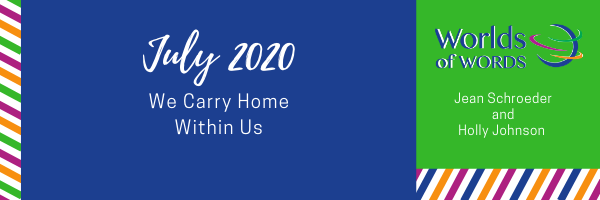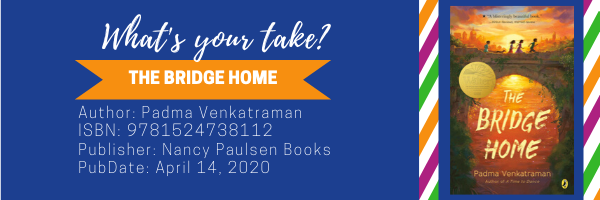
By Holly Johnson, University of Cincinnati, Cincinnati, OH and Jean Schroeder, The IDEA School, Tucson, AZ
When asked about the concept of home, many of us might conjure up visions of family together at a dinner-table or of vacation. We often think of a physical location, like a house, a street, a neighborhood or a city. But is that home? Or is home something more elusive, maybe harder to grasp or explain, especially if our idea of home is not of a house, or yard or neighborhood? This month, we look at books that address the concept of home and how that concept might be different from the typical or stereotypical. In The Bridge Home by Padma Venkatraman, we start with a group of orphans living under a bridge in Chennai, India, and then move to a young girl who understands home is where her dog is. We then discuss a longer migration that involves moving from Syria to the U.S. and end with the concept of home perhaps being an object of hope we can hold in our hands, keep in our hearts or imagine with our minds.

HOLLY: I enjoyed reading The Bridge Home. The resilience of Viji, who watches after her older sister Rukku while trying to live in an abusive home is inspiring. Viji decides the two sisters can no longer stay in the home just to watch their mother continue to take the abuse, so they board a bus and find themselves homeless and hungry in Chennai, India. They eventually befriend two young boys and together the four make a family. While I enjoyed reading this book, it is a horrific existence for children and an all too real experience for many young people around the world. What these young people do to survive is remarkable and gives an accurate picture of life on the streets for many orphans. Perfect for middle school students, this is a lovely book for thinking about others, about conditions around the world, and ultimately, what hope looks like. What I especially love about this book is the adults who reach out to help. Overall, a very satisfying read for me. What did you think of the book, Jean?
JEAN: I also enjoyed this story. From the moment Viji decides they need to leave I was concerned about how the sisters would manage in the city and all the threatening situations it presents. I questioned Viji’s optimism at being able to find work and support both of them. I kept waiting for something catastrophic to happen to the girls–a feeling of when is the other shoe going to drop. Connecting with Arul and Mathu who have experience navigating the streets of Chennai, Viji learns how to slosh through the endless mounds of stinking garbage looking for recyclable items. This is difficult to tolerate for Viji (and me) and impossible for Rukku, but with the boys showing her the ropes they are able to make enough money to survive. When their makeshift home on the bridge is destroyed, I began to see the children express what “home” means to each. Their clothes and mats had all been shredded into pieces, but Mathu finds one of Rukku’s beads and Arul finds Viji’s treasured book. These things all of a sudden mean “home.” One bit that becomes a defining piece in the children’s concept of home is the fairy tale that Viji tells Rukku to soothe her. In the story, the girls are princesses living in a palace. The tale expands to include princes as well. When their bridge home is wrecked, Muthu says, “It is the best place I have ever lived in. Except for Rukku and Akka’s palace.”
HOLLY: It is amazing how “home” becomes something we treasure, and in this case something the girls can hold in their hands. Home also comes to mean other people, and not just blood relations, but perhaps those with whom we share our lives and our hardships as well as our joys and victories. Given what we have gone through globally (and in some locations perhaps still going through), considering the concept of home is something that we may have all had to wrestle. Especially in respect to our shared hardships.
I love how the sisters embrace the two boys and they become a family BECAUSE they share the same situations and experiences. Sometimes such bonding is lifelong, which is also a lovely way to think about the creating and sharing of our sense of home. A sense of home may, in fact, have gone larger over the crisis all nations shared this winter and spring. I can only speak for myself about this, but I know I am concerned about all who suffer through the COVID-19 crisis. I may not know all who suffer, but I certainly empathize with the fear and pain expressed through various media. I also love the joy people share as they celebrate life in spite of the stay-at-home situations. It is said that we bond more over shared pain or brokenness. That might be true. What do you think, Jean?
JEAN: It is interesting that you point out that the sisters embrace the boys. I see it just the opposite way–that the boys embrace the girls. The boys are the ones with the experience and the established home on the bridge while the girls are the newcomers. This definitely speaks to the need we all have to be with others–to build a support community. In the case of these kids, they also recognize, with some trepidation, the need to expand their support community and, thereby, their family.
I also think an important point is that Viji opens the door to re-establish ties with her biological family. However, she refuses the invitation to return to them now that she has a new and more promising definition of “home.” This new relationship with her parents carries a message of hope, a theme throughout this book. Hope and home. Home and hope. They may be so entwined with each other that they are difficult to distinguish.
[Admin Note: The Bridge Home was our WOW Recommends: Book of the Month for October 2019 and also featured our August 2019 My Take/Take.]
Title: The Bridge Home
Author: Padma Venkatraman
Publisher: Nancy Paulsen Books
ISBN: 9781484781517
Date Published: February 5, 2019
Throughout July 2020, Holly and Jean give their takes on books in which we carry home within us. Check back each Wednesday to follow the conversation!
- Themes: Bridge Home, Holly Johnson, Jean Schroeder, Padma Venkatraman
- Descriptors: Books & Resources, My Take/Your Take
